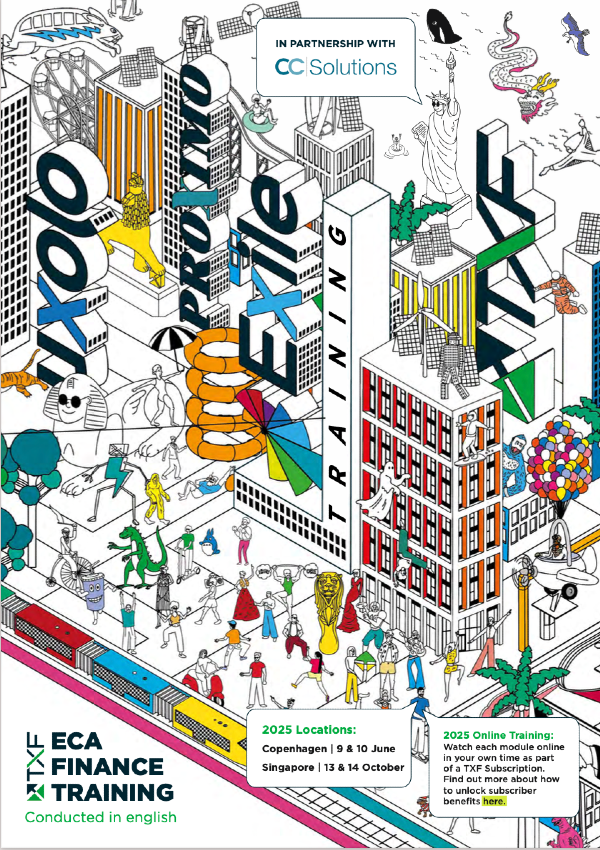ABCP: Needs must when the devil drives in discombobulated trade markets?
China’s underreported new ABCP digitisation play, if it works, could have implications for trade finance markets. It’s a big if, but it certainly warrants closer attention to how the pilots could presage changes to sidestep bank financing.

‘Needs must when the devil drives,’ is a phrase that recently popped back into my head for the first time in a very long time. I first said it on stage when I played Miss Furnival in a school performance of Peter Schaffer’s Black Comedy (she was a teetotaller turned lush). It dropped back in my head when I saw that back in June, China’s NAFMII (National Association of Financial Market Institutional Investors), a body in China for regulating the OTC market trading is encouraging Asset Backed Commercial Paper (ABCP) issuance.
Specifically, China Zheshang Bank, described by S&P Global as the world’s 99th largest last year, issued the first ABCP on a blockchain in early June. The ‘Lianxin 2020 Lianjie First Phase ABCP,’ which was worth RMB120 billion (around $17 billion) was set up as a vehicle to securitise accounts receivable and provide financing to SME customers of the bank. It comes as part of a pilot drive to increase digitisation prompted by the PBoC and directed by NAFMII. The aggregate pilot programme size is around $468 billion, with around $198 issued. Perhaps not that big, but significant in other ways. As Ann Rutledge, CEO of Creditspectrum says, “It could leapfrog the traditional market model in ways that tend to diminish the financing role of banks in the ABCP model, and this (if it works) could have global appeal, not just appeal inside China. Add to that the potential to start rolling up Chinese Fintech IP into these markets…”
Why is this interesting?
Discombobulation is a good word you rarely see, but it is something apt to describe parts of the markets for financing trade. Any post crisis economic recovery is neither U, W or J shaped, a better letter to describe it would be Q for question mark. Some of the ways of financing this recovery globally, albeit at the periphery of vision, are worthy of note.
In the GFC, ABCP was largely (and rightly) put under the spotlight because of the questionable quality of many assets bundled into securitisations and the proliferation of orphaned conduits. According to the latest figures from the US St Louis Fed, ABCP outstandings have plunged from the pre 2008 heights of $1.2 trillion to $261 billion at the end of July [though there was an uptick in the early stages of the Covid crisis in the US in March/April which fell back subsequently].
Revolvers drawn
Much has been written about the run for credit at the beginning of the crisis, with many highly rated corporates drawing down revolving credit facilities (RCFs) with their banks because they can, not necessarily because they needed the finance right then. When asked what concerned him most at the moment, one CEO of a non-bank platform provider told TXF, “The key topic for me is what is going to happen to RCFs – they were drawn down at scale during start of Covid-19 – when they come up for renewal will banks aggressively reprice them, cut limits or request they are refinanced with asset based facilities such as receivables finance?”
Revolvers drawn does sound like the middle of a western movie. Nonetheless, some of the heavy lifting for financing trade is going to have to be run through supply chain finance (SCF) programmes for corporates. And that raises all the issues we’ve discussed before, the ongoing tussles for regulation of SCF and its debt-like features. Will regulators take their foot off the pedal in the crisis?
As one group treasurer of a consumables company told TXF, what interests him most is the “the grey area where trade finance becomes general finance because of the longer payment terms as a result of SCF.” And, that’s an important point. Why shouldn’t it be?
The CEO of the non-bank platform provider went on to say, “I am most excited about how major banks in 2020 are committing to rebuild their trade finance platforms….many of the large ones are coming to [our platform] but this shows real commitment by them to growing the sector.”
That optimism is encouraging, but there is a nagging worry that traditional trade finance itself is still being burdened by the misplaced risk weight of Basel regulations on banks’ abilities to lend [though as one US investor asserts: “Misplaced risk weights? Why are banks the best placed to do trade finance versus bond markets?”] The investor adds: “Banks can never be the best financing source. They are financed by consumers and corporates. Asset backed collateralisation from a bank can never be the best solution then. And who cares about digitisation if no one will pay for it?”
Transactional trade finance has traditionally had very low default rates. Obliquely, there’s also the fact that the time scale of short term finance is under the radar screen of most default studies. Time is a strange concept in finance, and as Rutledge points out, this too was the appeal of ABCP, “the possibility of structured cheating by playing games with time – a 20 basis point default rate on a three-week obligation is actually 0.2% x 52/3 = 3.5%. Prime implies around 0.5-2.5% default rate.”
But then of course, there’s the taint of fraud. Amid the reflected headlights of high profile (commodity finance) frauds such as Hin Leong in Singapore, SocGen is shutting its Singapore trade commodity desk. Meanwhile, BNP Paribas is halting new commodity trade finance deals in EMEA without contractual obligations in early August amid Phoenix Group and GP Global Group challenges. It remains difficult to ‘see’ commodities, to trust and verify.
Digitisation as a salve?
Joining the dots of how trade can be financed through a recovery, digitisation remains an area of promise and (intermittent) delivery. Having the visibility and control of trade finance instruments is something that will certainly help, and in many instances the crisis has given a real kick to the process – particularly in electronic bills of lading, for instance. This still benefits the more trusted incumbents in the Fintech sector than the new kids on the block, and new business in the blockchain area has been piecemeal and still slow, but in areas, quite exciting.
Looking at those China pilots in more depth: rollover
NAFMII emphasises that the ABCP programme was created to fill a hole in the market but otherwise is completely within the scope of Asset-Backed Notes (ABNs, the bank ABS market). According to Rutledge, there are several interesting things that may make their ABCP market different.
First, Zheshang’s programme Lianxin Lianjie used in connection with its multi seller structure SCF is quite traditional even though it uses blockchain technology for settlement. In contrast, one of the other pilots, the industrial finance bank, Xinye, is arranging ABCP conduits for individual factoring companies in Tianjin and Shijiazhuang. The factoring companies are single sellers, but Xinye is doing the underwriting on behalf of its client company. “This style didn’t win in an evolutionary sense in the US, but it may work in China, since the goal is SCF and not Basel-style capital management.”
NAFMII points out that the only difference to ABNs is that the short-term nature allows the notes to roll over. This could potentially signal a transition towards a more mechanical approach to tracking performance which is made possible by use of giant databases called blockchain. Rutledge says: “The SCF focus of the new ABCP pilot makes it different from the US-EU market, which got bogged down in regulatory capital avoidance games. It MIGHT be safer as a result.” Nonetheless, she also sounds a cautionary note. “On the other hand, rollover risk may be handled in a different way from the standard US ABCP market, and this could add to risk, or it could leapfrog the traditional market model in ways that would diminish the financing role of banks in ABCP —but of course, to the extent they manage fraud risk, the operating role could still be vital.”
Getting the rollover right is key
It’s long been a problem in conduits that the assets going in may start off being okay, but then the quality and ability to replenish gets in trouble. The ability to get rollover right, in an economically straightforward way could be the missing link between SCF and trade finance. In theory, as Rutledge points out, digitisation could facilitate the link between short and long term finance, moving from discrete to continuous monitoring. “When you roll over paper in a conduit, you lose the link to the underlying assets, but in a database, you don’t… conceptually they are very close, but one looks an awful lot like MSME finance and the other is an instrument.”
Does promoting ABCP outside China make sense again? I don’t know. As a tool for channelling liquidity, banks are still sovereign. Banks need to be able to bank trade better. Is the real backstory that bank funding via conduits would be better (or at least bigger) than alt finance and Fintechs? ABCP conduits justifiably got a bad rap in the GFC. For sure, they would need to be better. Better regulated, better visibility of underlying assets (and digitisation and blockchain could help here), more effectively rated. With the need for better structuring vehicles in trade more evident than ever, more digitisation could help, as could more enlightened regulation that does not game the system in the way that Basel potentially does.
Some bankers are privately less concerned that Basel will be that distorting, mostly because they don’t think it will happen in its current undiluted state. “My personal view is that its full implementation will be postponed even further than the one year they’ve already done, so out from 2022 to 2023. Given the Covid situation, there are likely to be national pushbacks even further, or it could even be adopted, but with regulators showing a blind eye on enforcement,” one banker told TXF. Wishful thinking or practical expediency?
China’s latest experiment with ABCP will be interesting to follow as it tries to help shadow banks finance SMEs. In theory, ABCP could be the inflection point where China actually changes its approach to ABS – it has traditionally shied away from unsecured ABS – and uses digital technology to pull ahead. The technical argument is a quite compelling because it is surreptitiously powerful.
Watch this space, and the regulators’ responses to conduits. I can continue with Miss Furnival’s drunken rant…”Prams! Prams! Prams in the supermarket! ... All those hideous wire prams full of babies and bottles…. “ She wasn’t a big fan of innovation (in that case, it was supermarket trollies), but sometimes, needs must. I’d welcome your thoughts.
Now time to get up to speed with the markets
Here's a selection of original TXF Subscriber articles recently published
The first phase of the 800MW Al Kharsaah solar PV project in Qatar has reached financial close despite the Covid-19 crisis. The project is backed by a world record low tariff for a solar scheme to meet conditions precedent, after bids for the 2GW Al Dhafra solar PV in Abu Dhabi came in even lower last month.
New head of commercial finance for Bank Leumi UK
Roy Shilo has been appointed head of commercial finance for Bank Leumi UK. His new role at the bank encompasses trade finance services and products for SME customers.
Banja Luka-Prijedor motorway PPP signing delayed
Chinese company Shandong Hi-Speed Group Corporation has delayed financial close of its Banja Luka-Prijedor motorway PPP in Bosnia and Herzegovina due to planning permissions.
Adani Green Energy out to banks for project debt
Adani Green Energy is sounding out banks for $1 billion of short-term project finance debt. The India-based renewables developer is targeting a three-year tenor and has been talking with banks for a few months.
BI Energia develops 1.8GW Brazilian offshore wind portfolio
BI Energia, a Brazilian-Italian company, is on course to develop an offshore wind portfolio of just under 1.8GW on the coast of Brazil, after the company filed its first step for an environmental license last month.
BNP Paribas halts new commodity trade finance deals amid EMEA review
BNP Paribas has halted new commodity trade finance deals while it reviews its involvement in the business in Europe, Middle East and Africa.
Laughlan Waterston and Tom Waterhouse change roles at SMBC
Laughlan Waterston, head of energy and natural resources at SMBC in London, will shortly be moving to Dubai to take up the position of head of corporate and project finance, Middle East division.
Kazak healthcare EoIs due for advisory role
The deadline for expressions of interest (EoIs) from prospective advisers to assist Kazakhstan’s Ministry of Healthcare on the priority project in its hospitals modernisation programme are due.
Taiwan reduces offshore wind auction rounds
Taiwan's Ministry of Economic Affairs’ Bureau of Energy and Industrial Development Bureau held its second public consultation about the island’s nascent offshore wind market, after Bureau officials proposed reducing the number of upcoming auction rounds from three to two and increasing the amount of installed capacity that is up for grabs in each auction.





